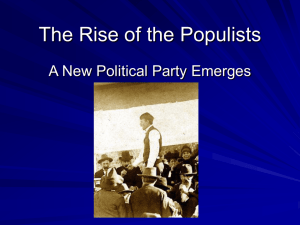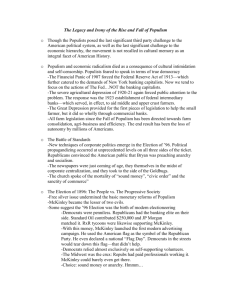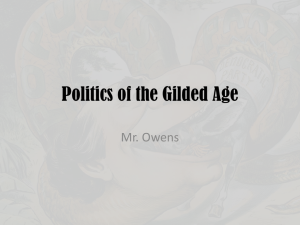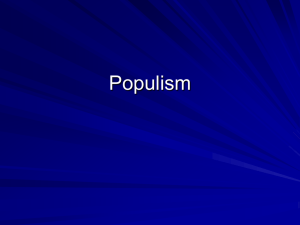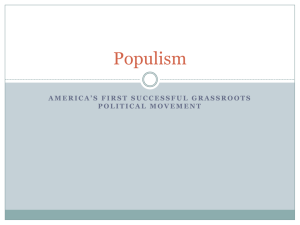Politics and Reform - Lake County Schools
advertisement
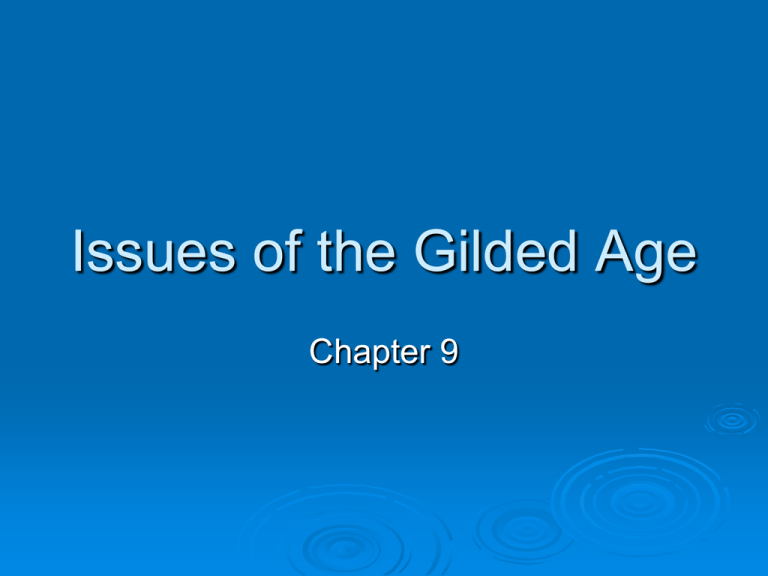
Issues of the Gilded Age Chapter 9 Stalemate in Washington When Pres. Hayes took office, he attacked the practice of patronage (giving jobs to those who support you) by appointing reformers and kicking out those who got their job through a party boss Party bosses were referred to as “Stalwarts” Republican reformers were called “Halfbreeds” since they gave up on reconstruction after the Civil War, allowing Democrats back into office The election of 1880 was won by the mix ticket of James Garfield, a Halfbreed and Chester Arthur, a Stalwart Stalemate in Washington Pres. Garfield was in office only a few months before being assassinated His assassination led to the passing of the Pendleton Act which says a president may only appoint someone who as completed the appropriate exams to qualify for the job; after appointment, that person cannot be removed for political reasons Pres. Arthur supported the act despite him being a Stalwart This is when the US begins to move away from the “spoils system” or patronage Stalemate in Washington Republicans during this time: Controlled New England and the Midwest Were supported by Union soldiers and strongly patriotic people as well as big business and Great Plains farmers Party of reform (supported abolition, temperance) Party of morality Stalemate in Washington Democrats: Supported by the South (whites) Supported in big cities with large immigrant and/or Catholic populations The party of personal liberty Both parties had equal distribution of power during the 1870s-1890s (usually) Elections of 1880 and 1888 came down to swing states Where have you heard this term before? Stalemate in Washington The election of 1884 came down to a Republican named James Blaine and a Democrat named Grover Cleveland Many Republicans abandoned Blaine and became known as “Mugwumps” meaning they thought is was more important to help the country than follow party lines In the end Cleveland took the presidency by winning NY (a typical Republican stronghold) Stalemate in Washington Pres. Cleveland was an easy-going person in his personal life, but would soon see how stressful the job of president is Many Democrats felt he should give them jobs, many Mugwumps felt he should multiply the number of positions covered under the merit system He chose a middle ground, making both groups angry The economic issues ahead would soon overshadow the debate over the political system Stalemate in Washington Many Americans believed that the railroads were price gouging since corporations like Standard Oil could get “rebates” or partial refunds, and lower prices due to the amount they shipped while small businesses and individuals were stuck paying much higher prices This led to the Interstate Commerce Commission creation • Made it illegal to offer rebates to high volume customers, charger higher rates for short hauls and limited RRs to “reasonable and just” rates • Was not really effective because the courts had to uphold the law Stalemate in Washington The issue of tariffs would once again reemerge in a presidential election since Congress was deadlocked on the issue Republican candidate Benjamin Harris supported higher tariffs, while Cleveland didn’t One of the closest elections in history resulted from the two candidates • Harrison lost the popular vote but won the electoral college, therefore becoming the next president • Can you think of any other president who lost the popular vote, but won the electoral college? Stalemate in Washington With Congress back in control of the White House and both the House and Senate, they were able to pass the McKinley Tariff which cut tobacco taxes and tariff rates and raw sugar, but hiked tariffs on things like textiles This turned the federal budget surplus into a budget deficit which would get worse after more veterans received more money for the pension plan Stalemate in Washington Republicans did respond to popular pressure to do something about trusts and corporations that dominated certain markets The Sherman Antitrust Act of 1890 made declared illegal any “combination in the form of trust…or conspiracy, in restraint of trade or commerce among the several States.” This vaguely worded law did little to change businesses until years later under T. Roosevelt Populism Populism was the movement to increase farmers’ political power and to work for legislation in their interest The problem for farmers was that they were producing more goods, which tends to drop price, however, at the same time, high tariffs increase the cost of manufactured goods needed to run the farms Populism Money problems also plagued farmers with regards to inflation and deflation The US had issued “greenbacks” as a form of money during the Civil War Because there was more money on the market, the value of money went down which means the price of goods soared After the Civil War however, the government decided to stop printing greenbacks which lead to deflation or the increase in the value of money causing the price of goods to drop again The deflation hurt farmers because the banks began to raise interest rates on loans while they were having to sell their goods at a cheaper price Populism Farmers realized that they needed to organize in order to get the government’s attention They created cooperatives—marketing organizations that worked for the benefit of their members Farmers from Lampasas County, TX created the Farmers’ Alliance which quickly expanded beyond TX Farmers’ Alliance turned into the People’s Party, also known as Populists, in KA • They would run for legislative positions and eventually president Populism In 1890 the members of the Farmers’ Alliance met in Ocala, FL and issued the Ocala Demands Called for development of the sub treasury plan (government set up warehouses and low interest loans) Free coinage of silver End to protective tariffs and national banks Tighter regulations of RRs Direct election of senators Populism Republicans in Congress pushed through the Sherman Silver Purchase Act of 1890, which allowed the US to purchase 4.5M ounces of silver/month They did this to keep people from voting for Populists The Democrats adopted several proAlliance policies, which they would later decline to follow through with Populism Due to the failure of the Democrat-proAlliance measures, many Southern Democrats turned to the Peoples’ Party In the 1892 election, the Peoples’ Party nominated James Weaver who ran on the platform of increasing money supply and a graduated income tax While Weaver did well for a small party candidate, Cleveland still won the election (note: Cleveland was president 4 years earlier) Populism The Panic of 1893 began due to RRs going bankrupt, bank’s closing and a stock market crash Cleveland had to summon Congress into a special session to repeal the Sherman Silver Purchase Act so the country’s gold supply would not be depleted Some Democrats, including Cleveland, felt the economy should be based on gold (they were called “goldbugs”) Others believed it should be based on an unlimited quantity of silver (they were called “silverites”) Populism The election of 1896 was the beginning of the end for the Populist movement: The Populists felt they could get most Democrats votes if they slammed Cleveland during the campaign Their plan failed when the Democrats put up William Jennings Bryan (a strong supporter of silver, the Populists’ main platform) The Populists decided to support Bryan rather than split the silverites Populism The Republicans put up William McKinley who launched the “front porch campaign” where he stayed in Ohio and met with people while the Republicans did campaigning elsewhere for him In His slogan was a “full dinner pail” which meant more to urban workers than the argument over silver or gold the end, McKinley won a decisive victory over Bryan Populism After McKinley took office and the Gold Standard Act was passed which made the US officially adopt a gold-based currency, the Populist movement lost momentum It would take another century for some of their reforms to be adopted including the graduated income tax and governmental regulations of the economy

